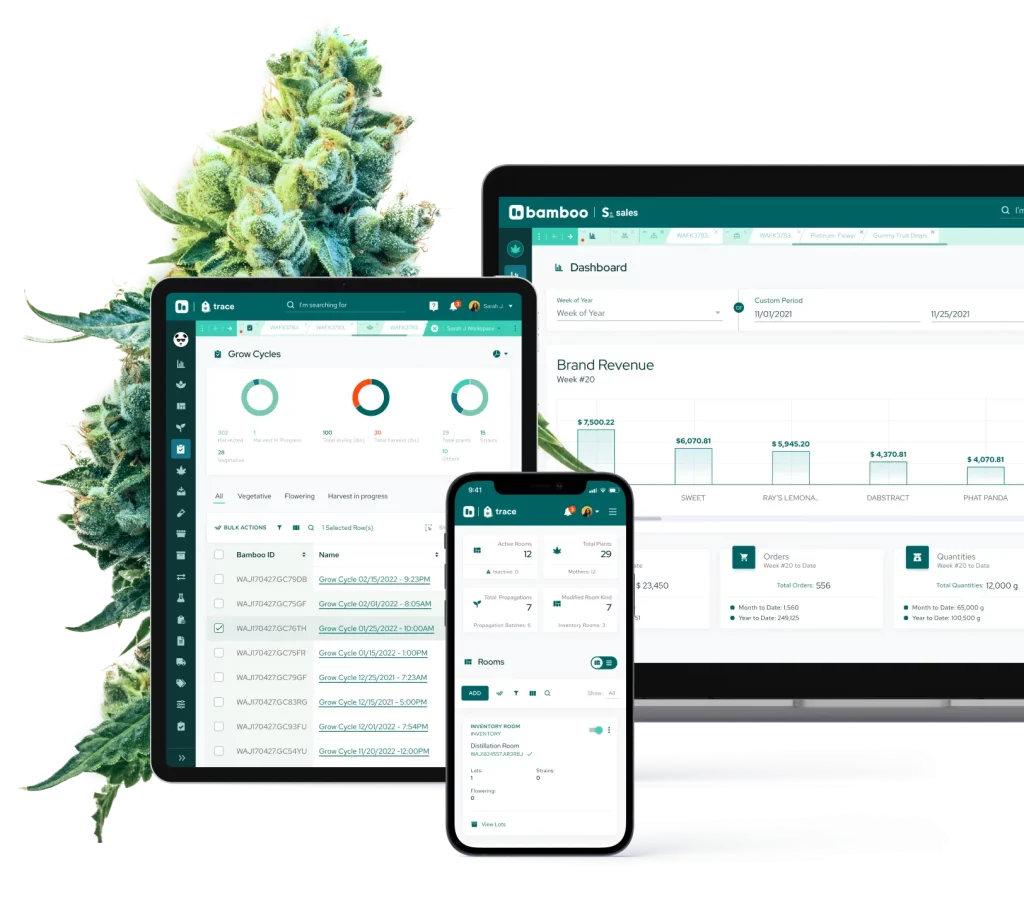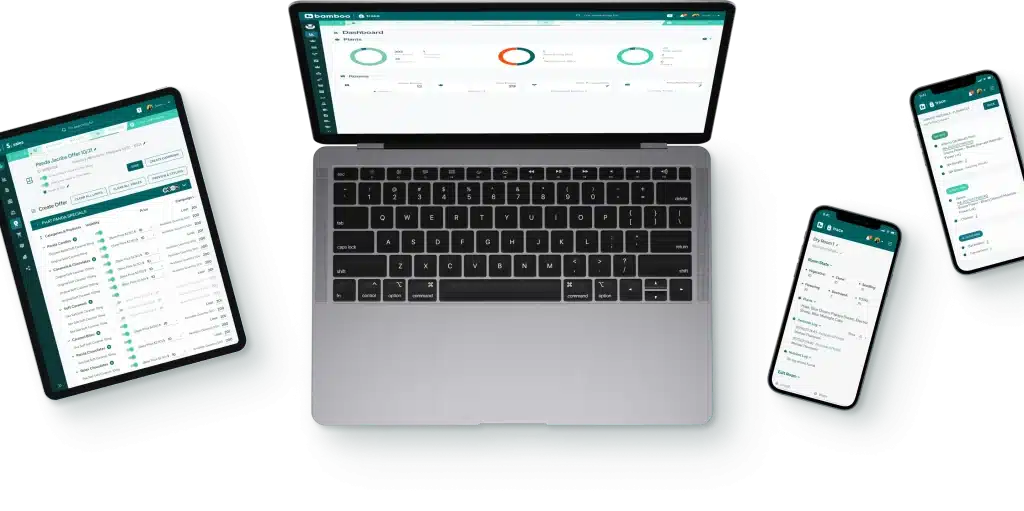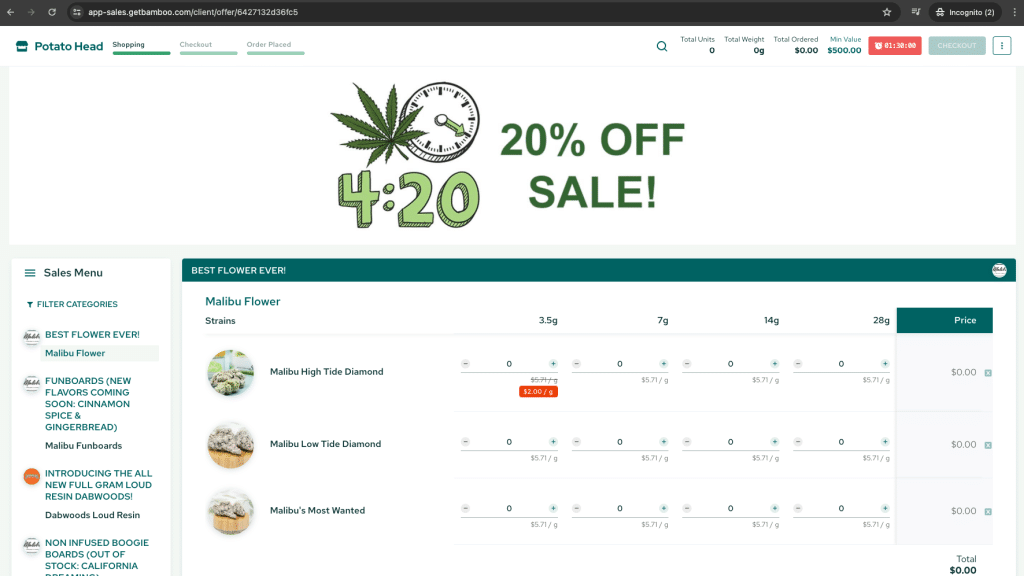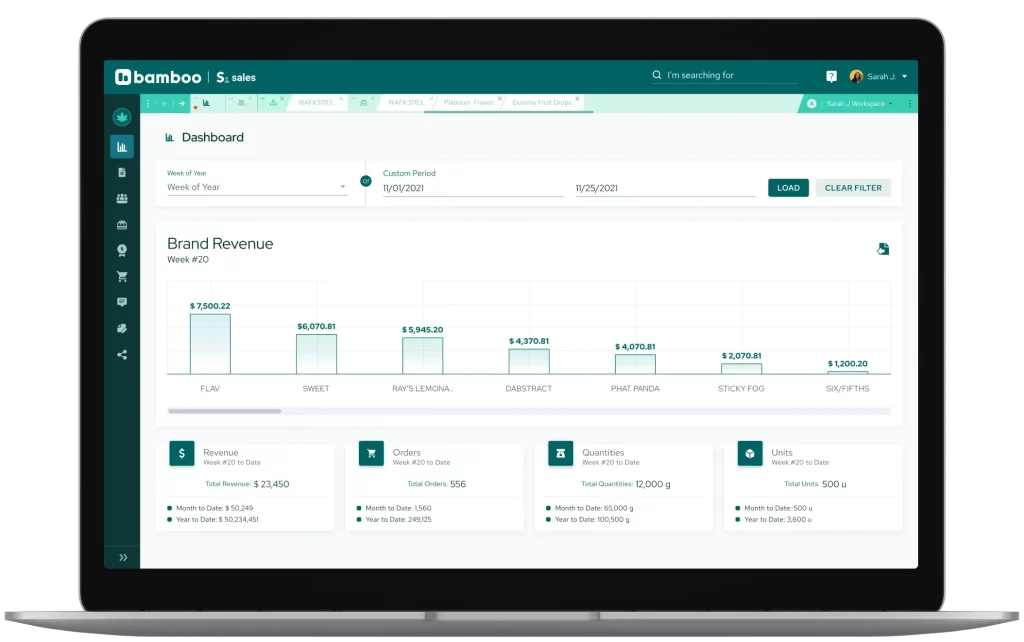New York Seed to Sale Cannabis Software
In the heart of New York’s vibrant cannabis industry, Bamboo emerges as the go-to software solution designed specifically for the state’s unique regulatory landscape. Our platform seamlessly integrates traceability compliance and sales optimization, empowering businesses to streamline operations and maximize revenue potential.
With Bamboo Sales and Trace, cannabis enterprises in New York can efficiently manage inventory, ensure adherence to state regulations, and seize opportunities for growth. Our intuitive interface, customizable sales tools, and robust compliance features work together to help your business thrive in New York’s dynamic cannabis ecosystem.
Experience the transformative power of Bamboo firsthand by booking a demo with one of our knowledgeable sales representatives. In just 10-15 minutes, you’ll gain a comprehensive understanding of how our all-in-one solution can revolutionize your operations and drive success in New York’s competitive market.
Don’t miss this opportunity to witness the game-changing capabilities of Bamboo in action. Schedule your demo today and discover how our tailored software can propel your cannabis business to new heights in the Empire State. Let Bamboo be your partner in navigating New York’s exciting and evolving cannabis industry.

New York's Recreational Market
New York’s recreational cannabis market has experienced rapid growth and development, following the launch of adult-use sales in December 2022. Here’s an overview of some key developments:
- Sales and revenue:
- According to the New York Office of Cannabis Management, total adult-use cannabis sales for the first full year of operation (January to December 2023) reached approximately $1.5 billion.
- The state collected around $300 million in cannabis tax revenue, which is allocated to various programs, including education, community reinvestment, and drug treatment.
- Market trends:
- New York’s market has been characterized by a strong demand for a wide range of products, with consumers eager to explore legal cannabis options in the nation’s largest city.
- Flower, pre-rolls, and vape cartridges have been the most popular product categories, followed by edibles and concentrates.
- The state has seen a growing interest in social equity brands and businesses, with many consumers seeking to support entrepreneurs from communities disproportionately impacted by cannabis prohibition.
- Regulatory developments:
- Throughout 2023 and early 2024, the New York Office of Cannabis Management continued to issue regulations and guidance for the adult-use market, focusing on product safety, packaging and labeling requirements, and social and economic equity provisions.
- The state has prioritized licensing for social equity applicants and has worked to create a diverse and inclusive cannabis industry.
- Industry growth:
- New York has seen a rapid expansion of its cannabis industry, with numerous new dispensaries, cultivators, and manufacturers entering the market, particularly in New York City and other major urban centers.
- The state’s medical cannabis operators have played a significant role in the early stages of the adult-use market, with many expanding their operations to serve recreational consumers.
- The industry has attracted significant investment from multi-state operators and local entrepreneurs, reflecting the immense potential of the New York market.
- Social and economic equity:
- New York’s cannabis legalization law, the Marijuana Regulation and Taxation Act (MRTA), includes robust provisions aimed at promoting social and economic equity in the cannabis industry.
- The state has established programs to prioritize licensing for individuals from communities disproportionately impacted by cannabis prohibition, as well as support for minority- and women-owned businesses.
- A significant portion of cannabis tax revenue is earmarked for community reinvestment in areas harmed by the War on Drugs.
- Challenges:
- Despite the rapid growth of the legal market, New York has faced challenges related to the persistence of the illicit market, which continues to undercut prices and attract consumers.
- The state has also grappled with local control issues, with some municipalities opting out of allowing adult-use cannabis businesses within their jurisdictions.
- Ensuring equitable access to the legal market and preventing the consolidation of the industry by large, well-capitalized players remains an ongoing concern.
Overall, New York’s recreational cannabis market has experienced impressive growth and strong consumer demand in its first year of operation, cementing its position as a major player in the East Coast cannabis industry. With a focus on social and economic equity, product safety, and industry diversification, the state has laid the foundation for a robust and inclusive adult-use market. However, challenges related to the illicit market, local control, and ensuring equitable industry participation will require sustained attention and collaboration among regulators, businesses, and community stakeholders as the market continues to mature.
New York's Road to Recreational Cannabis
New York’s journey to legalizing recreational cannabis has been a multi-year process involving legislative efforts and the development of a regulated adult-use market. Here’s an overview of the key milestones:
- Medical cannabis legalization: In 2014, New York passed the Compassionate Care Act, establishing a medical cannabis program for patients with certain qualifying conditions.
- Early legalization efforts: From 2013 to 2019, several attempts were made to legalize recreational cannabis through the New York legislature. However, these efforts did not gain sufficient support to pass.
- Decriminalization: In 2019, New York decriminalized the possession of small amounts of cannabis, reducing penalties for possession of up to one ounce to a fine.
- Successful legalization: In March 2021, New York lawmakers passed the Marijuana Regulation and Taxation Act (MRTA), legalizing the possession, use, and sale of recreational cannabis for adults 21 and older. Governor Andrew Cuomo signed the bill into law on March 31, 2021.
- Regulatory framework: The MRTA established the Office of Cannabis Management (OCM) and the Cannabis Control Board (CCB) to oversee the licensing and regulation of cannabis businesses in the state.
- Social equity and restorative justice: The MRTA includes provisions to promote social equity in the cannabis industry, including prioritizing licenses for individuals from communities disproportionately affected by cannabis prohibition and investing in community reinvestment programs.
- Rules and regulations: Throughout 2021 and 2022, the OCM and CCB worked on developing rules and regulations for the recreational cannabis industry, covering areas such as licensing, cultivation, manufacturing, testing, and retail sales.
- Retail sales begin: While the exact date for the start of recreational cannabis sales in New York has not been announced, the state is working towards launching retail sales in late 2022 or early 2023.
As New York’s recreational cannabis industry takes shape, the state is focusing on creating an equitable, diverse, and well-regulated market that prioritizes social justice, economic opportunity, and public health. The state’s approach to legalization has been hailed as one of the most progressive in the nation, with a strong emphasis on addressing the harms caused by past cannabis prohibition.
Traceability, Compliance & Regulation in New York
In New York, the regulation and tracking of both medical and recreational cannabis will be facilitated through the use of a seed-to-sale tracking system. While the state has not officially announced the use of Metrc (Marijuana Enforcement Tracking Reporting Compliance), it is expected that New York will implement a similar system to ensure compliance with state regulations and prevent diversion of cannabis products into the illicit market.
Traceability: Once a seed-to-sale tracking system is in place, all licensed cannabis businesses in New York will be required to use it to track the movement of cannabis and cannabis products through the supply chain. This includes tracking plant growth, harvest, processing, testing, packaging, and sale to consumers. Each plant and product will be assigned a unique identification tag, allowing for detailed tracking and accountability throughout the system.
Compliance: The Office of Cannabis Management (OCM) and the Cannabis Control Board (CCB) are responsible for regulating both the medical and recreational cannabis programs in New York. Licensed cannabis businesses must comply with a range of regulations that are currently being developed, which will likely cover areas such as:
- Licensing and renewal requirements
- Security and surveillance
- Inventory tracking and management
- Testing and labeling of products
- Packaging and child-resistant containers
- Advertising and marketing restrictions
- Social equity and community engagement
The seed-to-sale tracking system will serve as a tool for the OCM and CCB to monitor compliance with these regulations. Licensees will be required to input data into the system and will be subject to inspections and audits to ensure adherence to the rules.
Regulation: The OCM and CCB will oversee the licensing, regulation, and enforcement of New York’s cannabis industry. This includes:
- Issuing licenses for cultivation, manufacturing, testing, and retail operations
- Conducting background checks on license applicants and employees
- Inspecting licensed facilities and enforcing compliance with regulations
- Investigating complaints and taking disciplinary action against licensees who violate the rules
- Collecting taxes and fees related to cannabis sales
- Promoting social equity and diversity in the industry
Some key regulations in New York’s cannabis industry, as outlined in the MRTA, include:
- Prioritizing social equity applicants and those from communities disproportionately impacted by cannabis prohibition in the licensing process
- Allowing for the expungement of certain cannabis-related criminal records
- Investing 40% of tax revenue from cannabis sales into communities disproportionately affected by past cannabis prohibition
- Enabling home cultivation for personal use (up to 6 plants per person, with a maximum of 12 plants per household)
As New York’s cannabis regulations continue to take shape, the state aims to establish a safe, equitable, and well-regulated cannabis industry that balances access for consumers with public health and social justice concerns, while also promoting economic opportunity and community reinvestment.
What are the drawbacks of cannabis marketplaces?
In New York’s rapidly evolving cannabis market, traditional marketplaces are becoming increasingly popular, providing a centralized platform for buyers to discover a wide range of brands and products. However, this convenience often comes at a cost for sellers, as they find themselves engaged in intense price competition to gain a competitive edge. While these marketplaces offer a stage for brands to showcase their offerings, they often fall short in delivering meaningful value beyond that. As a result, New York’s cannabis businesses may struggle to differentiate their products and maintain control over how they are presented to potential customers.
Bamboo offers a revolutionary solution to this challenge by empowering New York’s cannabis brands to create highly personalized sales menus and take full control of their product presentation. With a suite of powerful tools designed to create custom menus and generate targeted recommended orders, Bamboo enables brands to truly stand out in New York’s competitive landscape and drive increased sales. By focusing buyers’ attention on specific cannabis brands and products, Bamboo helps foster deeper engagement and encourages larger purchases.
The success of a cannabis brand in New York will be largely determined by the level of effort and strategic thinking invested in developing and refining its sales menus. While the allure of relying on marketplaces for visibility may be strong, brands that seize control of their sales strategies and menus are better positioned to achieve sustainable success within New York’s dynamic cannabis industry.
As New York’s cannabis market continues to grow and evolve, it is essential for brands to adopt innovative solutions like Bamboo to differentiate themselves and build lasting relationships with customers. By leveraging the power of personalized sales menus and targeted product recommendations, New York’s cannabis businesses can navigate the complexities of the market, drive growth, and establish themselves as leaders in this exciting and rapidly expanding industry.
With New York poised to become one of the largest cannabis markets in the United States, the opportunities for brands to succeed are immense. By partnering with Bamboo and harnessing the power of customized sales strategies, New York’s cannabis businesses can position themselves at the forefront of this transformative industry and capitalize on the vast potential it holds.
Bamboo Trace
✔ Quick-action buttons available in every module for swift navigation and action execution.
✔ Simplified traceability through real-time two-way synchronization with New York’s seed-to-sale system (BioTrack).
✔ Receive instant notifications for important updates and events.
✔ Work in offline mode, accessible on both mobile and desktop devices, especially useful during periods of downtime in BioTrack API systems.
✔ Ability to support multiple licenses for comprehensive management of operations.
✔ Customize label templates to meet New York’s BioTrack regulations and efficiently generate multiple labels for various plant and product requirements.
✔ Comprehensive management of Strains, Rooms, Propagations, Grow Cycles, Plants, Harvests, Disposals, Inventories, Conversions, QA Samples, and more, all integrated within Bamboo Trace.
✔ Effortlessly process orders and generate manifests in just minutes for enhanced efficiency.

Bamboo Sales
✔ Utilize the finest Sales Menus available in Cannatech for enhanced sales strategies.
✔ Seamlessly integrate Sales Menus with your website for expanded reach and accessibility.
✔ Simplify email marketing efforts with the built-in feature tailored for sending sales menus effortlessly.
✔ Gain insights through comprehensive sales analytics and reporting on clients, sales reps, and customizable metrics.
✔ Generate numerous recommended orders (proposals) to cater to diverse client needs.
✔ Customize Real-time Sales Menus according to preferences and branding.
✔ Easily manage discounts, credits, pricing tiers, and distribution lists for streamlined operations.
✔ Efficiently handle all your sales enablement strategies within the Bamboo Sales platform.

